Thyroid 101
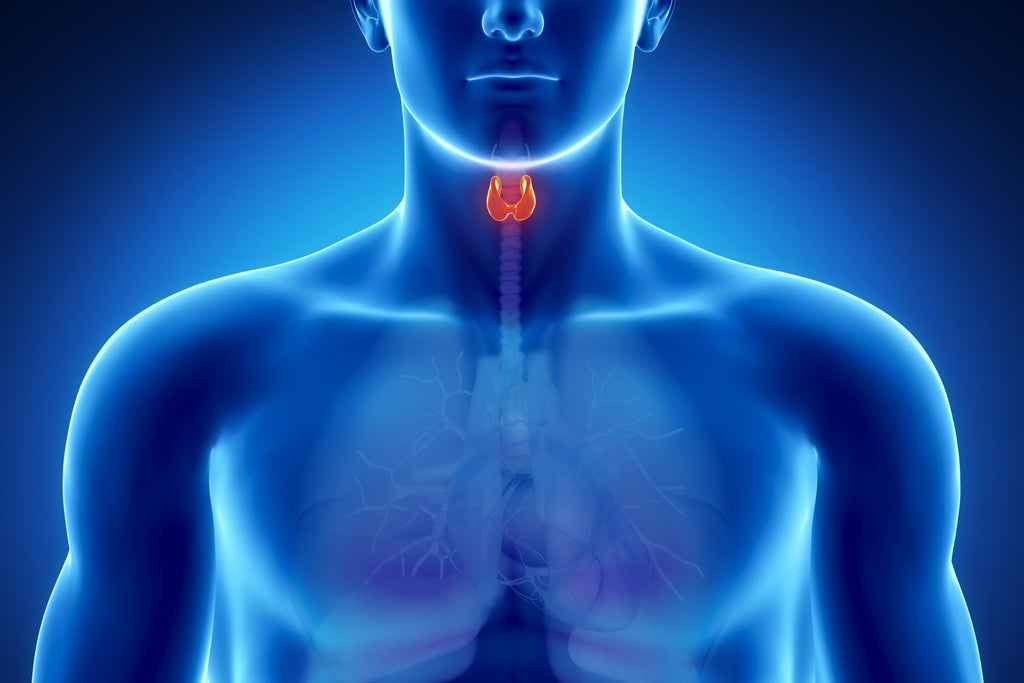
The thyroid is a gland that sits in front of the throat and controls all of the metabolic functions of the body. The thyroid produces a variety of hormones that act as communicators and regulators for the metabolic system. Virtually every part of the body is affected by the thyroid, so it is important for the correct amount of these hormones to be produced in order to feel healthy.
Hyperthyroidism
Too much thyroid hormone being produced is called hyperthyroidism, which means that the thyroid is overactive. Symptoms of hyperthyroidism can include a rapid or irregular heartbeat, rapid weight loss, nervousness, goiter, and other consequences of an overactive metabolic system.
Hypothyroidism
Too little thyroid hormones being produced is called hypothyroidism, which means that thyroid function is underactive. A diagnosis of hypothyroidism means your thyroid is low functioning. Symptoms may include cold hands and feet, headaches, low energy, easy weight gain or difficulty losing weight, problems with fertility, and many other metabolic irregularities. When the thyroid is running on low, it will mean that the entire system is running on low and essentially all of your metabolism is compromised. When the metabolism is low, not only do we gain weight easily but we have difficulty clearing toxins from the body. The thyroid helps to remove histamine, which is produced in response to things that we were exposed to in the environment, like allergens. It also helps to remove chemicals we might be sensitive to, and even mold aflatoxins.
Your thyroid health affects your whole body
A high-functioning thyroid is critical for the entire system to operate as it should. All tissue in the body has thyroid receptors, and therefore any deviation from the norm will not only impair body function but give the feeling of being generally unwellness. There are thyroid receptors in the brain, meaning low function causes brain fog. There are thyroid receptors in the heart, which can change the rhythm of the heart. There are thyroid receptors throughout the entire human system that help us to move as we should. There are even thyroid receptors in the mitochondria, the part of the cell that generates ATP, or energy, meaning that the thyroid affects us down to a cellular level.
Nutrients for healthy thyroid function
In order for the thyroid to work as it should, many nutrients must be in place. When the body builds a thyroid hormone, it requires tyrosine, an amino acid, as the fundamental building block for making thyroid hormone and iodine to help complete the hormone. For example, T4 is tyrosine plus four iodine, T3 is tyrosine plus three iodine. Our body makes 4 thyroid hormones: T4, T3, T2, and T1. T4 must convert to T3, which is 10 times more active than T4. Unfortunately, many conventional therapies only provide T4 without providing other thyroid hormones even when someone has their entire thyroid removed. In order to convert T4 to the more active T3, two other nutrients are necessary: we must have adequate levels of selenium and zinc to drive the reaction. In fact, research has shown that low zinc levels alone can decrease thyroid hormone production by up to 30%. Ashwagandha, a botanical that provides antioxidants and reduces stress response, has tremendous data in terms of improving TSH (the signal from the brain), T4, and T3- the most active thyroid hormone. This conversion happens predominantly in the liver so we must also have good liver health to help support the conversion from T4 to T3. Natural substances that help improve liver health are glutathione, NAC, and milk thistle. In addition to supplements that support the liver, there are many botanicals that can help us to produce more thyroid hormones such as Ashwagandha and Irish Moss, particularly when used in support of natural thyroid hormones from animal products. By utilizing botanicals and nutrients we can help the body to produce more of its own thyroid hormone to address the underlying causes as well as augment and support a prescription of thyroid hormones.
Subcritical thyroid hormone levels- testing is important
According to the Journal of Endocrinology, half the population that has an abnormal thyroid is missed with conventional thyroid testing. What is most commonly tested or routine to look at is TSH. TSH is sent by the brain as a signal to the thyroid to regulate the production of thyroid hormones. This means the signal goes up when the brain is calling out for more thyroid hormones and the signal goes down when the brain feels satisfied with the amount it is getting. Current reference ranges are from .3 to 4.5, but the Journal of Endocrinology says that one may be suffering from hypothyroidism if the TSH is above 2.5. This means that anyone with a test result for TSH that is above 2.5 is considered “normal” in the standard of care as far as thyroid function goes, even though the Journal of Endocrinology says this is abnormal. Even if that person is experiencing symptoms that are consistent with hypothyroidism, they are told, based on dated numbers, that they are within normal range and that nothing should be done. In addition to TSH, it is common to look at T4 as well, but none of the other thyroid hormones. This is unfortunate because T3 is the most active of the thyroid hormones, and if we only measure T4 we haven't even measured the one with the most activity and the one that most drives thyroid function. Most testing will also not examine the antibodies that attack the thyroid. This is important because if one is producing antibodies that attack thyroid hormone your number or level of thyroid hormone may be normal, but the antibodies prevent it from working as it should, and you will still have symptoms. To correct this incomplete picture, it is necessary to measure thyroglobulin antibodies as well as TPO antibodies in order to get a more global view of all the areas where the thyroid pathway can fail. In addition, stress also plays a role. Some peoples’ bodies will take the most active thyroid hormone, T3, and convert it to an inactive thyroid hormone called reverse T3. This happens when a person is experiencing stress in a way that impacts their physiology. We must address strategies to control stress in order to have optimal thyroid function and we also need to measure all of the hormones in order to make sure that we have done a complete workup.
Oxidative stress testing may be helpful as well
If we are producing excessive amounts of free radicals, this will interfere with the thyroid's ability to produce normal levels of thyroid hormones. Looking at levels of glutathione, or markers of oxidative stress can be quite important.
Stool tests for thyroid conditions? Yes!
It may also be helpful to look at a stool analysis because it has been shown that people who produce antibodies to their thyroid have a different microbiome than those who don't, which means the bacteria in the gut may be much different than the norm. Those who have normal thyroid levels have a healthier microbiome. This demonstrates that correcting the microbiome is a way we can influence what's happening in the thyroid. In fact, bacteria that are produced in the gut can send a signal to downregulate the thyroid receptors in the body, where the thyroid hormone would bind. This will mean regardless of the level of thyroid hormone, it still won't have the desired effect on the body, because there is no receptor for it to bind to.
Food allergy testing and thyroid
Food allergy or sensitivity testing is also useful because, for example, if one is making antibodies to various foods or if one has a reaction to gluten there can be a cross-reactivity creating a reaction in the thyroid as well. Finding out which foods one is sensitive to and removing them from the diet can be critical in terms of helping the thyroid to function better.
Adrenal testing and thyroid
Adrenal testing can also be useful, as adrenals control stress or cortisol. When cortisol is abnormal this can block the conversion of T4 to the more active T3. Cortisol can sit in the receptor where the thyroid hormone would bind and prevent it from working as it should. Managing adrenals alongside thyroid will radically increase the improvement in both areas.
Supplements for thyroid health
There are supplemental forms of thyroid glandulars that will provide thyroid hormones and can be a natural and effective way to increase levels. Some may prefer a glandular-free blend of natural ingredients Other nutrients that are involved in improving thyroid health are vitamin A, vitamin D, and omega-3 fatty acids, as these help the receptors to work better.
The thyroid is one of the critical components in the body that gives us optimal energy and a sense of well-being. When the thyroid is low, we can feel generally off and worn down. This can manifest in many symptoms that minimize the quality of life. Adjusting the thyroid is imperative for overall well-being. There are a number of nutrients that will support this process, and by utilizing more in-depth testing we can get to the bottom of what's going on with thyroid function and treat the root cause.
*By including product links in this article, Progressive Nutracare is providing a reference to our readers to assist in searching and cataloging the site. These products have not been evaluated by the F.D.A. are not intended to treat, diagnose, cure, or prevent disease.
- Robert Thomas

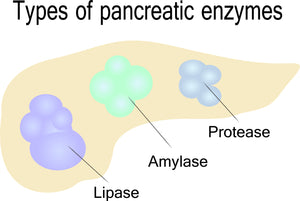

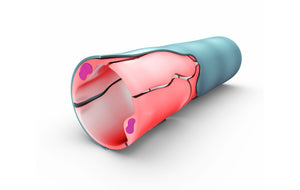
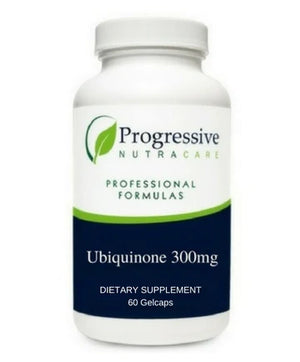

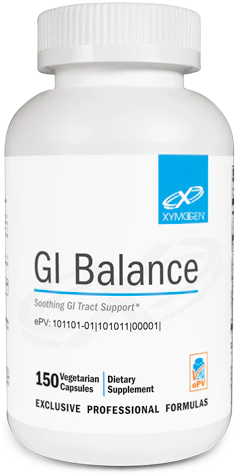
Comments 0